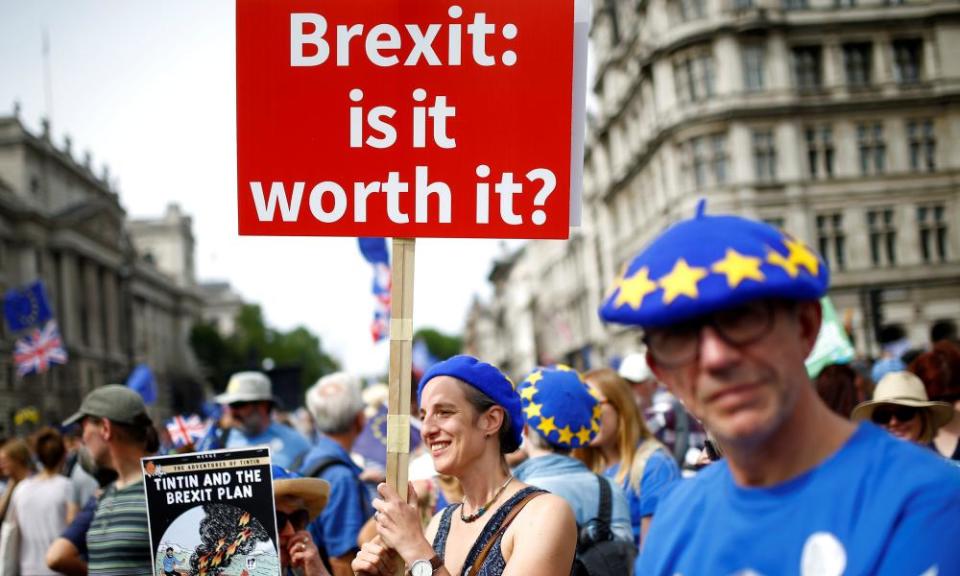Dire warnings of civil unrest shouldn’t stop us challenging Brexit

“Anger does not solve anything, it builds nothing, but can destroy everything.” So said Lawrence Douglas Wilder, the first ever elected African-American governor in the United States, who recognised the danger of allowing the emotion to fuel our decisions.
The threat of anger has become one of the last remaining arguments against a people’s vote on the final Brexit deal, which offers the right to remain in the EU. Anger at the possibility that the public should have the chance to consent to the government’s negotiated deal, which is at best a pound-shop version of what the leave campaign promised in 2016. Anger at the idea that democracy is built to allow people to change their minds. So much anger at the prospect of more democracy, some claim, that there would be “civil disobedience” and a further resurgence of the radical right.
It’s no surprise Brexiteers are on the defensive – given that negotiations have stalled and no Brexit plan is able to unite the cabinet, let alone parliament or the country. But the problem with the argument that Brexit is necessary to placate the radical right is that it surrenders too much. Along with Donald Trump’s election and populist success in Italy, the 2016 vote is one of the jewels in the crown of the new, paradoxically global, nationalist movement formalised by Trump’s former chief strategist, Steve Bannon.
In the face of anger, appeasement can appear to be the most expedient response, but it is rarely the right one
Surrendering to Brexit will not help us contain the far right, but will spur it on to even bigger victories. Following leave’s success in the Brexit vote, hate crimes rose by the highest rate on record. Across the country, minorities were targeted for abuse. “We voted for you to go home,” were the words that confronted so many, including Tinni Guha Roy, a former rower for team GB, in the weeks following the referendum. It was not the vote itself, but the result that became a clarion call for racists, and an electoral legitimiser of xenophobia.
In the face of anger, appeasement can appear to be the most expedient response, but it is rarely the right one. Donald Trump’s election victory did not satisfy the far right in the US. It accelerated the growth of a mass white-supremacist movement, which became deadly in Charlottesville last year.
The way that the Labour movement has beaten fascism in the past is by fighting it, not by bending a knee. The answer to containing Ukip is not becoming Ukip. The solution is to make the arguments for our own values more convincing, and to articulate why openness and engagement with the world is not only vital for our economic standing, but an outlook which enriches every walk of life.
If Brexit has taught us anything, it’s that legitimate grievances from working people should not be ignored. At the time of the 2016 referendum, we had endured six years of Tory austerity, which hit the poorest in our communities the hardest. Voting for Brexit was a way to bloody the noses of the Conservative government, which had grown increasingly out of touch. But a radical Labour government can only tackle the root causes of why so many people voted for Brexit in the first place if it has the money to do so. We will struggle to end austerity, rebuild public services and increase wages for the lowest-paid, if we allow a gaping hole to be cut in the government’s purse.
Nothing is more likely to entrench bitterness than making hard-pressed communities disproportionately poorer, as the government’s own impact assessments warn. Nothing could be more corrosive to our future than a Westminster elite ignoring the pleas of young people, many of whom didn’t even get a say in 2016.
Indeed, Brexit itself could lead to civil disobedience. Unlike those who use violence on the streets as a threat to those who want another vote, this is not speculation. Police leaders have already warned that a no-deal Brexit poses serious threats to public safety. Her Majesty’s Inspectorate of Constabulary and Fire and Rescue Services have said it will trigger a rise in hate crimes not seen since the 1990s. And the National Police Coordination Centre warned that the “necessity to call on military assistance is a real possibility” in the weeks that follow our country’s departure from the EU.
Those afraid of civil disobedience should ask themselves one question. What will make the public angrier: more democracy and the first chance to consent or reject the government’s negotiated Brexit deal; or less democracy and hundreds of thousands of job losses, the inability to live and work in Europe, food and medicine shortages, the worst-case scenario of a 35% drop in house prices, and the austerity that would likely follow another financial crisis as deep as 2008?
Now is not the time to lie down and appease the anger of the radical right, but to stand up and defend our values, before it is too late.
• David Lammy is Labour MP for Tottenham and the former minister for higher education

 Yahoo News
Yahoo News 